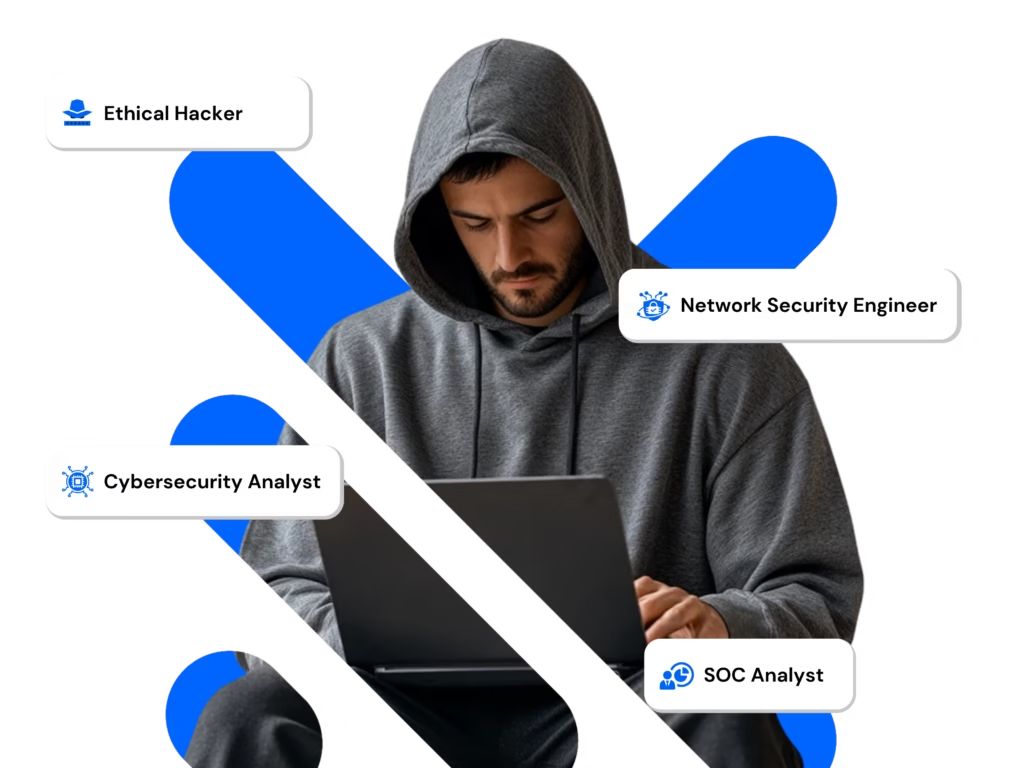In the morning, it is 2:00 your security tool displays a strange warning—a DNS request that doesn’t appear to be normal. And it doesn’t feel right, but it’s unclear if it poses a threat. Because of your rapid thinking, you are able to stop a potential cyberattack before it causes any harm. For this type of fast decision-making, network security engineers are always ready. Setting up firewall rules and monitoring dashboards are only two aspects of being a network security engineer; other responsibilities include knowing how systems interact, identifying suspicious activity, and acting before minor threats become major issues.
It’s about recognizing unexpected activity, understanding how systems interact, and acting before minor hazards become major issues. This could be the ideal profession for you if you like studying how systems operate, fixing problems, and maintaining composure under pressure. I’ll briefly go over the necessary education, training, and credentials in this post so you can get started. I will also discuss how learning platforms such as Cybrary can let you practice the techniques you will use to eliminate threats before they spread and get practical experience.

Why Network Security Matters:
Network security engineers are essential to safeguarding important assets. They guarantee that critical infrastructure, intellectual property, and sensitive data are protected from outside threats and illegal access. These engineers serve as the first line of defense, whether it’s a financial institution protecting transaction data or a healthcare provider protecting patient records. The need for qualified experts in this field is expanding quickly. Organizations are actively looking for specialists who know how to safeguard complex, hybrid settings since threats are always changing, from ransomware to advanced persistent threats.
Gaining expertise in network security engineering has benefits beyond just improving technical proficiency. It provides access to competitive pay, long-term professional progression, and in-demand work roles. Understanding the foundations of network security paves the way for future leadership, regardless of your career goals—be they senior engineer, architect, or even CISO.
By offering structured learning pathways adapted to actual professional duties, Cybrary facilitates this process. You will get the expertise and confidence necessary to succeed in contemporary network security environments because of their laboratories, certification preparation, and expert-led content.
Also read: Top 10 Ethical Hacking Tools you Should know
Skills required to become a network security engineer:
1. Foundations of Networking
The first step in cybersecurity is to understand how computer networks work. The fundamental communication guidelines that enable device data sharing via the internet are known as TCP/IP protocols. The OSI Model is an organizational structure that breaks down the way data moves between networks. It assists you in locating any possible weak points. Subnetting is similar to splitting a big network into more manageable chunks. This increases efficiency and security. Having a firm understanding of networking enables you to spot unusual activity and take steps to prevent it.
2. Security Tools like firewalls and IDS/IPS defence mechanisms
IDS/IPS (Defense Mechanisms) and firewalls—these are essential tools for keeping an eye on networks and guarding against malicious activities. As gatekeepers, firewalls filter communications according to predetermined rules. These will be set up to block threats and permit safe traffic. An intrusion detection system, or IDS, keeps an eye on network traffic and issues alerts when it notices questionable activity. By preventing or blocking threats in real time, an intrusion prevention system, or IPS, goes one step further. Setting up, maintaining, and improving these systems for the highest level of safety is what a network security engineer is supposed to do
3. Comfortable with Operating System Proficiency
Security of Operating Systems (Windows & Linux) You need to understand how to protect the systems that power your networks. Linux is frequently seen in security tools and servers. You must understand the fundamentals of command-line programming, firewall settings, and user permissions. Windows Server is widely utilized in commercial settings. Among the abilities are security policy management, user access management, and system activity monitoring. Being at ease in both settings improves your ability to adapt and expands your employment options.
4. Basic Knowledge in Automation and Scripting (Python & Bash)
You can boost workflow by automating repetitive security procedures using basic scripting. Python is perfect for creating simple tools, examining security logs, and scanning networks. And Bash is a robust Linux programming language that is used to write scripts for bulk activities or system monitoring. In simple words, knowing how to automate work can greatly simplify and improve the efficiency of your work; you don’t need to be a developer.
5. Risk assessment and management of vulnerabilities
One of your primary duties will be to find and fix vulnerabilities before they are taken advantage of. System scanning can be done with programs like Nmap, Nessus, or OpenVAS. Prioritize which vulnerabilities should be fixed first by assessing the threats’ seriousness. And then effectively patch issues by working with your team and documenting your findings. This ability is essential for any proactive cybersecurity position.

Certifications recommended for Network Security Engineer:
Entry-level certifications:
1. The CompTIA Security+
For those looking to work in cybersecurity, one of the most advised entry-level certifications is CompTIA Security+. Network security, cryptography, threat detection, risk management, identity management, and incident response are among the fundamental components of information security that are covered. Students who take Security+ gain a comprehensive understanding of cybersecurity concepts that are applicable to all kinds of networks and systems because it is vendor-neutral. Because it satisfies DoD 8570 compliance criteria and is generally accepted by employers, it’s a good starting point for network security.
2. Cisco CCNA (security or cyber operations)
CCNA CyberOps and CCNA Security are the two cybersecurity-related tracks offered by Cisco’s CCNA certification. With a focus on security best practices in Cisco settings, both sessions aim to develop fundamental networking skills. Threat detection and incident response are two skills that CCNA CyberOps teaches to get people ready for work in a Security Operations Center (SOC). On the other hand, CCNA Security has a strong emphasis on creating firewalls, controlling access, and safeguarding Cisco switches and routers. For beginners hoping to work in enterprise networks based on Cisco, these qualifications are perfect.
Mid-level certifications:
3. Certified Ethical Hacker (CEH) by the EC-Council
The goal of the CEH certification is to teach people how to think like hackers, but in a morally responsible way. It emphasizes social engineering, malware threats, vulnerability analysis, penetration testing, and system hacking. Candidates can better protect networks from threats by learning how attackers take advantage of systems. In the field of cybersecurity, CEH is highly respected and frequently serves as an entry point for positions like security analyst or penetration tester
4. Network Defender Certified (CND)
The EC-Council also offers the Certified Network Defender (CND) certification, which is more defensive than offensive. It provides network administrators with training on network security operations and technology. Network traffic tracking, firewall setup, VPN security, and incident response are important subjects. CND places a greater focus on practical defense strategies and safeguarding network infrastructure than CEH, which is more concerned with offensive techniques. For people who want to focus on strengthening and protecting network systems, it’s perfect.
5. Network Defender Certified (CND)
The EC-Council also offers the Certified Network Defender (CND) certification, which is more defensive than offensive. It provides network administrators with training on network security operations and technology. Network traffic tracking, firewall setup, VPN security, and incident response are important subjects. CND places a greater focus on practical defense strategies and safeguarding network infrastructure than CEH, which is more concerned with offensive techniques. For people who want to focus on strengthening and protecting network systems, it’s perfect.
Advanced-level certifications:
6. Certified Information Systems Security Professional, or CISSP
The (ISC)²-issued CISSP is a high-level certification designed for experienced security experts. Identity management, asset security, governance, compliance, and security architecture are just a few of the many security-related subjects it covers. Professionals looking for positions as a CISO, security manager, or security architect should consider CISSP. Senior-level competence is indicated by the requirement of at least five years of experience in two or more of the eight domains it covers.
7. Security with Cisco CCNP
For network security engineers who work with Cisco infrastructure, Cisco offers the CCNP Security certification. It verifies advanced knowledge of network security with Cisco tools and technologies, including systems to prevent attacks, firewalls, VPNs, and access control policies. Candidates can specialize in topics like SD-WAN security, firepower, or secure access by taking the certification’s core and concentration exams. For experts overseeing large business networks, it’s ideal.

Educational Qualification Requirements:
1. Bachelor’s degree in Computer Science
One of the most popular and beneficial educational pathways for those who want to work as network security engineers is a bachelor’s degree in computer science. In order to write secure code, analyze threats, and create secure systems, it offers a thorough understanding of algorithms, data structures, operating systems, and programming. Students are also introduced to computer networks, which is required for any position involving network security.
2. Degree in Information Technology (IT)
An information technology (IT) degree places greater emphasis on practical abilities linked to database management, network architecture, and system administration. IT system management and setup skills are taught to students, which is essential for putting security controls in place, keeping an eye on system behavior, and handling incidents. Graduates in information technology frequently have practical expertise with servers, firewalls, and security protocols that are employed in everyday settings.
3. A specialized degree in cybersecurity.
Those who wish to go right into the field of digital protection should consider pursuing a specialized degree in cybersecurity. Students enrolled in these programs will learn from the ground up about digital forensics, malware analysis, penetration testing, ethical hacking, and compliance frameworks. Graduates of the program, which focuses solely on security, are prepared for positions such as network security engineer, security analyst, or SOC analyst.
4. Electronics and Communication Engineering (ECE)
A degree in Electronics and Communication Engineering (ECE) may not appear to be directly connected at first, but it is extremely beneficial, particularly when it comes to understanding software- and hardware-level security. ECE students study microcontrollers as methods of communication and signal processing—all of which are important for protecting network hardware and Internet of Things devices. An ECE background, when coupled with security training, can offer a distinct advantage in positions involving both network-level and hardware protection.
What is the job of a network security engineer?
By firewall setting up, activity monitoring, risk analysis, and prompt action in response to abnormal or believed activity, a network security engineer defends systems against online attacks.
What abilities are required to secure networks?
Essential skills include understanding of Windows and Linux operating systems, firewall management, Python and Bash scripting, networking fundamentals, and vulnerability detection and repair.
What are the finest certifications to begin with?
Cisco CCNA and CompTIA Security+ are certifications that are easy for beginners to obtain. These help you establish a solid foundation in network security and are readily accepted by businesses.
Conclusion
Across all industries, network security engineering is a rapidly expanding, highly influential professional path that is essential to safeguarding digital systems. In an ever-changing threat landscape, network security engineers serve as the first line of defense, from preventing cyberattacks in the middle of the night to creating strong defense systems. We provide the correct combination of training, credentials, and practical experience, you may create a fulfilling profession that blends technical expertise with practical problem-solving.
There are numerous routes into this sector, whether you begin with a degree in cybersecurity, IT, or computer science or go the more unusual way by earning certifications and using training platforms like Cybrary or Sense Academy. Remaining ahead of threats requires critical abilities including vulnerability analysis, firewall management, system hardening, scripting, and networking fundamentals.
Also read: cisco.com site in en learn topics security what-is-cybersecurity.html





